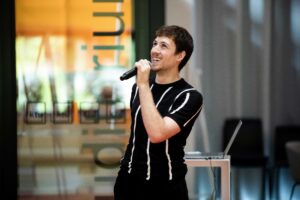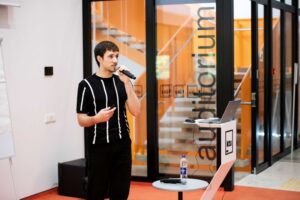In the end, he says, switching courses turned out to be a real lifesaver. If not for that, he wouldn’t have joined ECIU University – and taken his love for environmental engineering a step further.
“Different cultures, different mindsets, different everything”
João has finished three ECIU University challenges, all with a heavy focus on sustainability and a joint goal – to change how people view consumption and waste disposal. When talking about them, João notes that the challenges didn’t just help him learn more about recycling throughout the European Union, but also changed his perception of many other things.
“I really thought the way we recycle in Portugal would be the same as in Lithuania, France, or Germany. – he remembers – But it’s different for everyone. And people don’t just recycle differently – they do and see most things differently”.
“This experience taught me a lot about understanding the mindsets of others”.
All challenges stood out in their own way. The one from the Hamburg University of Technology made him fall in love with bioplastics – something João says wouldn’t have happened if he didn’t join in. He’s now researching bioplastics created from avocado waste with the professor from University of Aveiro and is excited to learn even more about it.
Another challenge introduced by Kaunas University of Technology urged the teams to reshape environmental education at schools – with João and his peers developing a series of cartoons for different age groups to highlight the importance of recycling in a kid-friendly, approachable way.
And then, there was the household waste sorting challenge from Kaunas University of Technology – the first one he took part in and, perhaps, the most impactful one, too. João joined expecting “to meet new people and learn new things”. He got a lot more than that.
They worked on the challenge as a team of five – two people from Portugal, one person from Italy’s University of Trento, and two from Kaunas University of Technology. It was João’s first time both communicating and collaborating with people from these countries.
Although new and somewhat unusual, the experience proved itself priceless – both as an opportunity to broaden his horizons and challenge his way of thinking, as well as a way to find the solution instead of just a solution.
“We had a great, diverse team. – João explains – Different cultures, different mindsets, different everything. We realised that we could all contribute to the challenge in different ways due to our different ways of thinking”.
Coming from each of the team members’ perspectives and their respective countries’ needs, they worked together to achieve the best solution possible – and the result paid off.
An app that fosters change
The household waste sorting challenge is how KAIP was born – an app designed to educate people about recycling and make waste sorting more accessible to city residents as well as tourists. It’s a whole lot of things: a database with helpful info on recycling, a handy selection of upcoming events near the users, games for kids to help them get into recycling, and, most importantly, an interactive recycling map. Something João says hasn’t really been done before.
A map – to which absolutely anyone can contribute – shows you the location of recycling bins nearby, which is especially helpful for travellers who want to recycle but don’t know their way around the city.
“Say, I know nothing about recycling in Kaunas and where the recycling bins are.”, João offers a quick example “Then, I can open the map and see their location. After that, I’ll go to Google Maps to find the quickest path to take and get there as fast as possible”.
Thanks to a 5000 euros voucher from ECIU University, the app is now one step closer to becoming a full-fledged part of the sustainability landscape – with the team currently working on its second prototype and collecting feedback. João believes KAIP’s potential is unlimited and hopes for it to be used all over the EU in the future. Maybe, even beyond.
It’s about more than studying
These days, João has a tight schedule, that includes his studies and environmental engineering research, projects with the ECIU University, and, of course, the KAIP app. However, this doesn’t seem to wear him off – on the contrary, the University of Aveiro student looks more excited than ever.
“When you’re doing something you love, you’re not really working, you’re just learning what you want to learn”, he believes.
João calls changing his major and joining ECIU University “the best decision of his entire life” – the one that allowed him to finally find his true calling and, hopefully, make a difference while pursuing it.
He feels like he has really changed throughout the challenges, too, and in more ways than he could’ve imagined. He learned to prioritise facts and cast away stereotypes in studies and life. With a huge amount of data to access and compare, he became an ardent researcher. He improved his communication skills and even turned into a devoted team player, despite considering himself more of a lone wolf before.
João has a lot of plans as well. He’s eager to participate in even more challenges, double down on research and get a Ph.D., perhaps, coming back to ECIU University as a professor at some point. He also hopes KAIP makes it big, but has no plans to earn with the app. Instead, he’d prefer to donate the second prototype to an international company that could make the most out of its potential and spread the word about recycling.
“I like to think of myself as a social entrepreneur”, João explains, “a person who comes up with an idea, tries to improve it, and then gives it to the company that can use it for the better”.
He really likes where he is right now – and adds that it would take him twice as much time to get there if it wasn’t for joining ECIU University. But most importantly, he enjoys being part of the change.
João explains that “it’s not just about connecting with people, improving your communication skills, exploring different cultures, or sitting in front of a computer for hours. It’s about learning more about real-world problems. Why they exist, how we can solve them, what are the other countries doing that we’re not – with all of your teachers and peers helping”
“I wouldn’t change it for the world”, he says.



